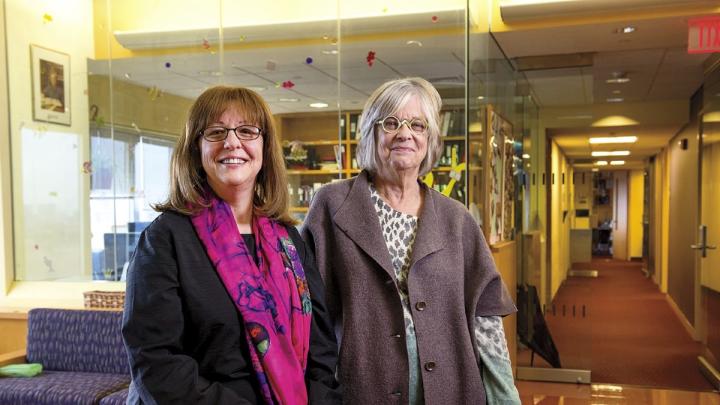What makes learning so difficult is that no mind—even a young one—is a blank slate.
Children under the age of five, for example, think that the wind and sun are alive, but that plants aren’t. They confuse signs of movement with signs of life; they think that inanimate things are dead. They can’t disentangle what it means to be alive from what it means to be real, to exist, or to be visible. When they talk about the body, they might say that the heart is for beating, and the lungs for holding air, but not that these organs connect.
Between the ages of six and 10, children construct a more advanced, vitalist theory of biology: they come to understand that the body must obtain energy from outside itself in order to function. This fundamental premise becomes linked to other concepts—that bodily functions sustain life, health, and growth, or that specialized body parts work together in a system. First, though, the kids must overwrite their original intuitions, a process that hugely taxes their mental resources.
When assistant professor of psychology Deborah Zaitchik of Harvard Medical School tested adults with Alzheimer’s disease on these same scientific concepts, the results surprised her. Many of her study subjects at Massachusetts General Hospital were retired physicians, scientists, and professors, yet, “looked just like four-year-olds on a whole series of tasks,” she says. The results from the two groups seemed to match perfectly. “Why should that be?”
She was also startled to discover another population whose vitalist theory had degraded: healthy elderly adults, between the ages of 65 and 81. On sorting tasks, they often misjudged airplanes, watches, and bicycles as being “alive” simply because they moved. What, she wondered, makes biological concepts so difficult to grasp, and to hold onto? Which cognitive processes does such conceptual change depend on?
When she asked Susan Carey, Morss professor of psychology, to suggest developmental psychologists who might want to collaborate on this question, Carey thought about her own work with adults born with Williams syndrome, a condition that leads to severe mental retardation, and offered to join Zaitchik’s project herself. Although adults with Williams syndrome have extensive factual knowledge and advanced language abilities, their understanding of biology remains stalled: one subject, for example, had an avid interest in the “funerary practices of other religions,” but no biological understanding of death. As Carey asked herself how this gap could occur, it became clear that conceptual development involves more than “just acquiring new facts.”
Zaitchik and Carey are now engaged in a multiyear, interdisciplinary research project that investigates the relationship between such conceptual change and “executive function” (EF), a suite of mental processes including inhibitory control (the ability to suppress distractions and inappropriate responses); set-shifting (the ability to switch between different modes of thinking depending on the nature of a problem or a goal); and working memory (the ability to actively hold information in mind while updating it). Adults with Alzheimer’s or Williams syndrome, they explain, have less EF and thus have either lost, or never built, a more advanced theory of biology. As for the healthy elderly, Zaitchik and Carey suspect they haven’t truly “lost” their biology knowledge; instead, their deteriorating EF undermines their ability to express that understanding. Their inhibition has become too weak to suppress the instinct that moving objects are alive.
In the case of young children, the literature linking stronger inhibitory control and working memory to higher math and reading scores had already suggested that these functions affect skill development. With their new finding that EF scores predicted scores on biology tests, Carey and Zaitchik showed that executive function also shapes conceptual development. Recently, one of their postdoctoral research fellows, Igor Bascandziev, ran trials in which he led young elementary school children in “training sessions” that modeled how body parts work together. Children with higher EF scores left with a stronger understanding of bodily systems and, more surprising, of vitalist concepts they hadn’t been explicitly schooled in: the ideas of “alive” and “dead.” As Zaitchik puts it, “They got the bigger bang for the buck.” For those children, “Learning is more effective.”
Understanding the cognitive functions that govern learning may, down the road, change pedagogy. “The business of education is conceptual change,” says Carey. Yet the implications of their research reach beyond curriculum design. Children in higher-income households tend to have stronger EF, she points out, emphasizing that “executive function is not a fixed trait.” Indeed, new research suggests the opposite. Last November, psychologists at New York University published a study showing that kindergarteners in a program focused on strengthening their executive function demonstrated large gains in math, reading, and vocabulary—and the effect was particularly large for children in low-income schools.
Zaitchik and Carey remain hopeful about the potential “downstream” impact of their work generations hence, but for now, they will focus on the big, underlying theoretical questions that excite psychologists and philosophers. Three years into their National Science Foundation grant, says Carey, they feel confident they are “barking up the right tree.” They’ve established that executive function has a powerful relationship to conceptual change. In the next two years, they’ll seek to answer the questions of how and why.








